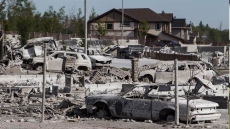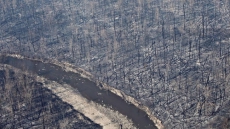OTTAWA — Major public assets like airports, ports and highways would offer some the most intriguing opportunities for private investment should stakes in such assets ever go on the block, says one of the country's biggest potential investors.
The federal Liberals are considering a system that could see Ottawa — as well as other levels of government — sell infrastructure assets under their jurisdiction.
Mature Canadian infrastructure is still mostly owned by governments and putting a "For Sale" sign on it would offer a tantalizing opportunity for large players such as the massive Ontario Teachers' Pension Plan.
Andrew Claerhout, who leads the pension plan's infrastructure group, said he's encouraged by Ottawa's recent signals it could make more public infrastructure available.
Claerhout said the organization, which holds net assets of about $170 billion worldwide, is on the lookout for "relatively large" investment opportunities — from the "hundreds of millions to the billions."
It's looking for projects that would produce returns through user fees — everything from snack bar sales in an airport to a highway toll booth.
The pension plan already holds about $17 billion worth of infrastructure investments internationally, but just $3 billion — less than 20 per cent — in Canada.
That's the conundrum — there's a limited number of federal assets with a lot of investment potential, Claerhout said in an interview.
"If there were enough high-quality infrastructure projects to invest in Canada, we would have a program that was predominantly Canadian," he said.
"I can assure you I don't need any more Air Miles."
The Trudeau government wants to engage institutional investors, such as pension funds, to help raise money for long-term infrastructure projects.
The Liberals have pointed to "asset recycling," which could eventually see different levels of government lease or sell parts of mature public assets.
"The key difference between asset recycling and divestiture (or privatization) is that funds generated are explicitly spent on new infrastructure," reads an internal, "secret" briefing note to deputy finance minister Paul Rochon.
The February document, obtained by The Canadian Press under the Access to Information Act, provides Rochon with background on Australia's asset recycling program, one of the best-known, large-scale examples.
Australia's federal government aims to attract billions of dollars in capital by offering incentives to states and territories that sell stakes in public assets.
The note to Rochon said the Australian government is offering to pay states and territories the equivalent of 15 per cent of the sale price of an existing asset — as long as all the proceeds are allocated to a new investment.
The $5-billion, five-year program is expected to leverage close to $40 billion in new infrastructure investments in Australia, it noted.
Asset recycling was mentioned in a recent review of the Canadian Transportation Act, which recommended Ottawa seek more private-sector cash by privatizing infrastructure like ports and airports.
The report, tabled in February and led by former Conservative cabinet minister David Emerson, said privatization would create a "source of new funding required for strategic investment in the system."

The privatization of infrastructure assets, however, has created concerns.
The federal New Democrats have warned that asset recycling will enable the Liberals to take credit for the extra infrastructure money, even though Canadians will be paying for it via new user fees and tolls.
Labour unions, meanwhile, have cautioned that the model could eventually mean lower wages for workers.
Last week, Finance Minister Bill Morneau acknowledged the government was looking at the "possibility of asset recycling."
"We would do so in places where we think it might be in the public interest to do so, such as mature assets that might possibly be able to be recycled, so that we could, in fact, enhance the long-term growth of our country," Morneau told parliamentarians.
Claerhout said he believes such an initiative could work in the Canadian federation, adding the pension plan was "thrilled" to see asset recycling mentioned in the budget.
He strongly encouraged Ottawa to entice the provincial and municipal governments to get involved in attracting private capital.
Except for airport and port authorities, he said the federal government has little jurisdiction over large infrastructure with sizable, reliable returns.
Airports and ports, however, are still intriguing.
For example, Claerhout said an airport investment has potential to generate big returns if an investor can improve how it's managed and lure more airlines to its runways.
"We can also make more non-aeronautical revenue, in terms of selling more lattes and selling more duty-free goods and whatnot," said Claerhout, whose fund already has investments in five European airports.
He said some types of provincial and municipal infrastructure, like wastewater, utilities and highways, can also be attractive investments for the pension fund.
Highways can interest investors as long as they can install tolls — something he acknowledged could be a tough sell.
Claerhout added that putting a price on roads might also encourage more people to choose the greener option of public transit over cars.
"If you took a road that used to be free and you tolled it, I think consumers are right to say, 'Hey, that used to be free and now it's being tolled, that's unfair,'" he said.
"But let's remember that governments need to balance their books somehow... I don't think they can raise taxes too much more. I don't think any of us want that."





